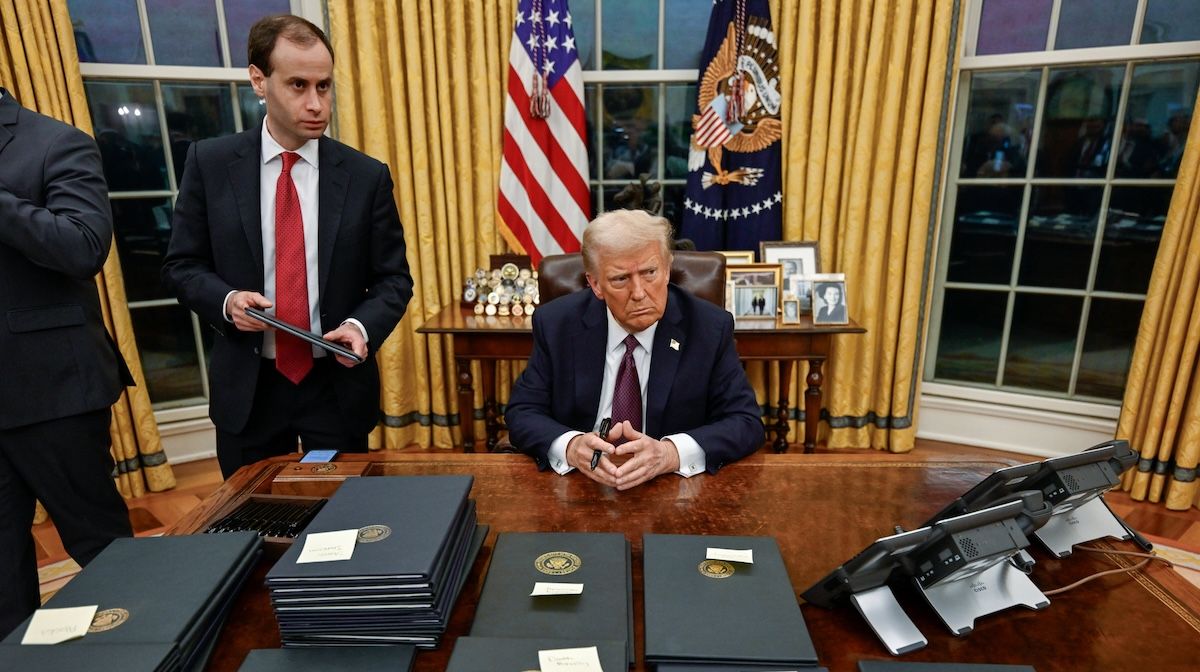January 2025 US Tech Policy Roundup
Rachel Lau, J.J. Tolentino, Ben Lennett, David Paiz-Torres / Feb 3, 2025Rachel Lau and J.J. Tolentino work with leading public interest foundations and nonprofits on technology policy issues at Freedman Consulting, LLC. Ben Lennett is the managing editor of Tech Policy Press, and David Paiz-Torres is a recent graduate from the Craig Newmark Graduate School of Journalism.

Washington, DC - January 21, 2025: President Donald Trump poses in front of a stack of executive orders. The White House
As the country navigates the shifting tides of political change, the past month saw a flurry of activity across all the branches of government on key tech issues. The judicial branch was active, with the Supreme Court upholding the federal law requiring TikTok to be sold off from its Chinese parent company, ByteDance, or face a nationwide ban. Despite the ruling from the court, members of Congress and the incoming president signaled support to give ByteDance more time to divest the platform. After an hours-long shutdown in the US in response to the Supreme Court decision, TikTok restored service, thanking President Trump for agreeing not to enforce the ban. The following day, Trump released an executive order pausing enforcement of the ban for 75 days.
In addition to the TikTok order, President Trump issued a series of executive orders reshaping federal policy on online speech, artificial intelligence, and trade, signaling a sharp pivot from the previous administration’s approach. Also, following President Trump’s executive order targeting diversity, equity, and inclusion (DEI) programs in the federal government, newly promoted Chair Brendan Carr of the Federal Communications Commission ended the agency’s DEI efforts, including striking DEI elements from the FCC’s strategic plan and budget.
The Federal Trade Commission (FTC), still led by Chairman Lina Khan until Jan. 31, issued new rules to tighten the enforcement of the Children’s Online Privacy Protection Act (COPPA). The FTC also took its first-ever action on connected vehicle data, proposing an order to settle allegations against General Motors (GM) and OnStar for violating the agency’s notice and consent requirements in collecting, selling, and using “drivers’ geolocation data and behavior information.
Finally, the new administration nominated numerous individuals for key roles across the federal government that will play a role in determining the government’s overall approach to technology and tech policy. Tech Policy Press, in partnership with Freedman Consulting, is tracking the appointments, nominations, and confirmations for more than 100 key federal tech-policy-related positions. You can find the tracker here.
Read on to learn more about January developments in US tech policy.
TikTok Temporarily Goes Dark, and Its Future Remains Uncertain
Summary
TikTok was front and center this month as the popular social media platform, with over 170 million users in the US, faced its long-awaited congressional ban. In April 2024, President Biden signed the Protecting Americans from Foreign Adversary Controlled Applications Act (H.R. 7521), giving ByteDance until January 19, 2025, to divest from TikTok or face a nationwide ban. The law was passed amid growing national security concerns related to connections between ByteDance–TikTok’s parent company–and the Chinese government.
On January 17, just two days before the ban was set to take place, the US Supreme Court upheld the law following a nine-month legal battle between ByteDance and the US government. The Supreme Court acknowledged that national security concerns impacted its analysis on whether the ban violated the First Amendment, ultimately concluding that the rationale behind the ban was "decidedly content agnostic.” In response to the ruling, the ACLU released a statement condemning the Supreme Court’s decision, stating that the court is “giving the executive branch unprecedented power to silence speech it doesn’t like."
On January 18, in response to the federal ban, TikTok shut down its platform for users in the US and removed the app from both the Apple and Google digital stores. This temporary shutdown lasted only hours. By January 19, TikTok announced via X that services would be restored and thanked President Trump for providing the “necessary clarity and assurance” to service providers that they would face no penalties for maintaining access to the platform. TikTok’s post on X was in direct response to a statement made by Trump on Truth Social promising to release an executive order to “extend the time before legal prohibitions on TikTok take effect.”
On January 20, just hours after being sworn into office, President Trump issued an executive order to halt the enforcement of the TikTok ban to provide the administration with additional time to “review the situation and determine its approach.” Sens. Ed Markey (D-MA), Ron Wyden (D-OR), Cory Booker (D-NJ), and Rep. Ro Khanna (D-CA) introduced legislation that would extend the deadline for ByteDance to sell TikTok by an additional 270 days. While the platform was available to US users, TikTok remained unavailable for download on digital stores at the time of this article’s publication.
What We’re Reading
- Haleluya Hadero, “The rise – and potential fall – of TikTok in the US,” AP News.
- Prithvi Iyer, “Reactions to the US Supreme Court’s TikTok Ruling,” Tech Policy Press.
- Justin Hendrix, “The Dumbest Timeline: The Supreme Court Rules on TikTok,” Tech Policy Press.
Trump’s Tech-Focused Executive Orders on Free Speech and AI
Summary
In his first few weeks in office, President Trump issued a wave of executive orders (EO), some of which sought to reshape federal policy on key technology policy debates like AI and content moderation. Among the many EOs released by the Trump Administration were three with significant impacts on the technology policy space:
- Restoring Freedom of Speech and Ending Federal Censorship: This EO prohibited federal government employees or officers from engaging in “any conduct that would unconstitutionally abridge the free speech of any American citizen.” The EO stated that the Biden Administration exerted improper pressure on social media companies to suppress speech under the guise of combating misinformation and disinformation. It required the Attorney General to investigate relevant actions taken under the Biden Administration and recommended “appropriate remedial action.”
- Initial Rescissions of Harmful Executive Orders and Actions: This EO rescinded over 70 Biden Administration executive orders, including President Biden’s AI Executive Order, “Safe, Secure, and Trustworthy Development and Use of Artificial Intelligence” (Executive Order 14110).
- Removing Barriers to American Leadership in Artificial Intelligence: This EO built upon the revocation of Biden’s AI EO by establishing the “policy of the United States to sustain and enhance America’s global AI dominance in order to promote human flourishing, economic competitiveness, and national security.” It ordered relevant White House and agency leadership to review actions taken pursuant to President Biden’s AI EO and submit an action plan to suspend or revise actions that are inconsistent with their ability to “sustain and enhance America’s global AI dominance.”
In addition to these three executive orders, President Trump also released other EOs with the potential to influence artificial intelligence and technology policy, including an EO “Declaring a National Energy Emergency,” that referenced AI’sgrowing energy requirements, and President Trump’s “America First Trade Policy,” which could shift the US’s approach torestricting the export of AI chips and other technologies to countries of concern.
What We’re Reading
- Alondra Nelson, Ami Fields-Meyer, “The AI Dangers of a Second Trump Presidency,” Tech Policy Press.
- Justin Hendrix, “Documenting the Assault on Disinformation and Hate Speech Research, “ Tech Policy Press.
- Eryk Salvaggio, “The Ugliest Thing San Francisco Ever Built: Lessons for AI Infrastructure,” Tech Policy Press.
Tech TidBits & Bytes
Tech TidBits & Bytes aims to provide short updates on tech policy happenings across the executive branch and agencies, Congress, civil society, industry, international governance, and courts.
In the executive branch and agencies:
- President Trump fired all three Democrats on the Privacy and Civil Liberties Oversight Board, pausing the board’s work and potentially hamstringing oversight of the government’s use of surveillance technology. Only Member Beth Williams remains on the board.
- The Federal Trade Commission (FTC) issued a final rule to the Children’s Online Privacy Protection Rule (known as COPPA), requiring “parents to opt into third-party advertising and includes other changes to address the emerging ways that consumers’ data is collected and used by companies, and particularly how children’s data is being shared and monetized.”
- The FTC published a staff report on the corporate partnerships and investments between the three largest cloud service providers (Alphabet, Amazon, and Microsoft) with Anthropic and OpenAI. The report describes the partnerships and their potential implications for competition in the AI space.
- The FTC also took its first-ever action on connected vehicle data, publishing a proposed order against General Motors (GM) and OnStar for collecting, selling, and using “drivers’ precise geolocation data and driving behavior information from millions of vehicles—data that can be used to set insurance rates—without adequately notifying consumers and obtaining their affirmative consent.”
- Following President Trump’s executive order targeting diversity, equity, and inclusion (DEI) programs in the federal government, Chair Brendan Carr of the Federal Communications Commission (FCC) announced the end of FCC’s DEI efforts, including striking DEI elements from the FCC’s strategic plan and budget.
- The US Patent and Trademark Office (USPTO) published the USPTO Artificial Intelligence Strategy to “unleash America’s potential through the adoption of AI to drive and scale U.S. innovation, inclusive capitalism, and global competitiveness.”
- The US Food and Drug Administration (FDA) issued non-binding guidance on the use of AI for drug manufacturing, providing a “risk-based credibility assessment framework that may be used for establishing and evaluating the credibility of an AI model for a particular context of use (COU).” The deadline for submitting comments is April 7, 2025.
- The Securities and Exchange Commission (SEC) announced the launch of a cryptocurrency task force led by SEC Commissioner Hester Peirce.
In industry:
- OpenAI, Softbank, and Oracle launched Stargate, a joint venture that will commit $500 billion over the next four years to AI infrastructure, in an announcement by President Trump at a White House briefing.
- Apple agreed to pay $95 million to settle a lawsuit accusing the company of using Siri, its virtual assistant, to secretly listen and record to users of iPhones and other Siri-enabled Apple products.
- A group of nearly 50 tech companies and civil society actors published a letter to the Senate Committee on Commerce, Science, and Transportation and the House Committee on Science, Space, and Technology in support of the U.S. Artificial Intelligence Safety Institute (AISI) within the National Institute of Standards and Technology (NIST).
- Meta eliminated its third-party fact-checking program, replacing it with Community Notes, which relies on users to write and rate. They also loosened content restrictions on topics like immigration and gender, focusing instead on “tackling illegal and high-severity violations, like terrorism, child sexual exploitation, drugs, fraud and scams.” Many civil society organizations called out the change as dangerous for users, including the Leadership Conference on Civil and Human Rights, Public Citizen, and Common Sense Media.
- The Software & Information Industry Association (SIIA) published its key strategic priorities for 2025 in four main areas: artificial intelligence, digital information policy, workforce cultivation, and innovation.
In the courts:
- The Supreme Court heard oral arguments in Free Speech Coalition, Inc. v. Paxton. The case involves alegal challenge to a Texas law,HB 1181, that would hold websites and other platforms liable for allowing minors under 18 to access “sexual material harmful to minors.” Though it is targeting sites like Pornhub, which already suspended service in the state, a Supreme Court decision that affirms the law could have broader implications, particularly for policy efforts to require age verification or age assurance on other platforms, such as social media.
- A federal district court in California ordered state leaders to stay, in its entirety, a law that would require platforms to block the posting of materially deceptive content related to elections. The same district court, in October 2024, blocked a companion state election deepfake law from going into effect after a legal challenge from Christopher Kohls, the creator of a deceptive AI-generated video that involved Vice President Harris and was promoted on X by Elon Musk. X later joined the lawsuit in November 2024.
Legislation Updates
The following bills were introduced across the House and Senate in January:
- Kids Off Social Media Act - S.4213. Reintroduced by Ted Cruz (R-Texas), Senators Brian Schatz (D-Hawaii), Chris Murphy (D-Conn.), and Katie Britt (R-Ala.), the bill would “set a minimum age of 13 to use social media platforms and prevent social media companies from feeding algorithmically-targeted content to users under the age of 17.”
- To require the Secretary of Homeland Security and the Secretary of State to implement a strategy… - H.R.488 and S.150. Introduced by Rep. Juan Ciscomani (R-AZ), Rep. Chrissy Houlahan (D-PA), Sen. Mark Kelly (D-AZ), Sen. James Lankford (R-OK), Sen. Thomas Tillis (R-NC) and Sen. Ruben Gallego (D-AZ), the bill would “require the Secretary of Homeland Security and the Secretary of State to implement a strategy to combat the efforts of transnational criminal organizations to recruit individuals in the United States via social media platforms and other online services and assess their use of such platforms and services for illicit activities.”
- To amend the Communications Act of 1934… - S.69. Introduced by Sen. Eric Schmitt (R-MO), the bill would “amend the Communications Act of 1934 to address governmental interference in content moderation decisions by providers of interactive computer services, and for other purposes.”
- To prohibit Federal employees and contractors from directing online platforms to censor any speech… - S.188. Introduced by Sen. Rand Paul (R-KY), Sen. Mike Lee (R-UT), Sen. Eric Schmitt (R-MO), and Sen Cynthia Lummis (R-WY), the bill would “prohibit Federal employees and contractors from directing online platforms to censor any speech that is protected by the First Amendment to the Constitution of the United States, and for other purposes.”
- To prevent anticompetitive conduct through the use of pricing algorithms… - S.232. Introduced by Sen. Amy Klobuchar (D-MN), Sen. Ron Wyden (D-OR), Sen. Richard J. Durbin (D-IL), Sen. Peter Welch (D-VT), Sen Mazie K. Hirono (D-HI), and several others, the bill would “prevent anticompetitive conduct through the use of pricing algorithms by prohibiting the use of pricing algorithms that can facilitate collusion through the use of nonpublic competitor data, creating an antitrust law enforcement tool, increasing transparency, and enforcing violations through the Sherman Act and Federal Trade Commission Act, and for other purposes.”
We welcome feedback on how this roundup could be most helpful in your work – please contact contributions@techpolicy.press with your thoughts.
Authors



